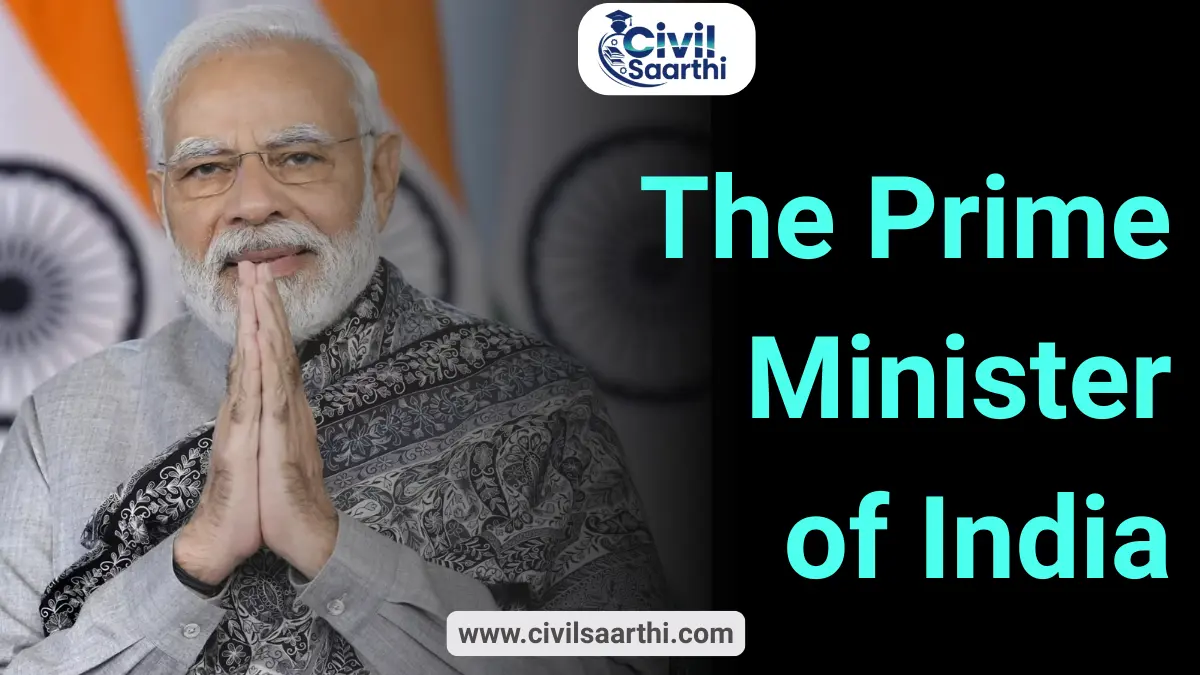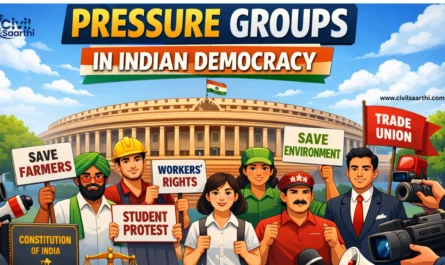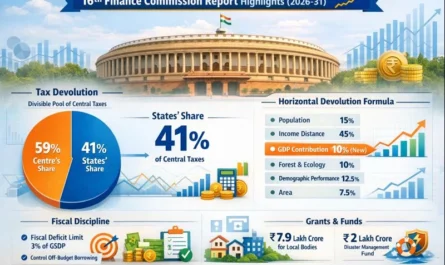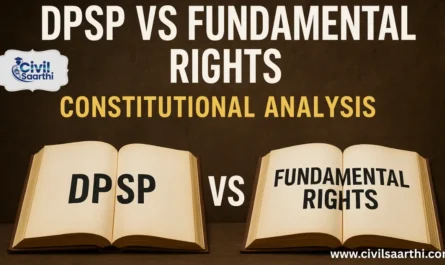The Governor of a state in India holds a pivotal constitutional office, acting as the nominal executive head of the state while representing the Union government. The post is similar to the role of the President at the Centre and is embedded in Part VI of the Indian Constitution, particularly under Articles 153 to 167. While largely ceremonial, the Governor plays a vital role in times of political instability, during the imposition of President’s Rule, and in maintaining the constitutional machinery of the state.
Understanding the office of the Governor is crucial for UPSC aspirants, as the topic is frequently asked in both Prelims and Mains, especially in the context of Centre-State relations, federalism, and constitutional crises.
Constitutional Provisions Regarding the Governor
Articles 153 to 167 of the Constitution lay down the framework for the Governor’s office. Article 153 mandates that every state shall have a Governor, though one person can be appointed Governor for two or more states. These provisions outline the appointment, powers, responsibilities, and conditions of service.
| Article | Subject | Key Constitutional Provisions |
|---|---|---|
| 153 | Governor for each State | Every state shall have a Governor. A single individual may be appointed as Governor of two or more states. |
| 154 | Executive Power of State | The executive power of the state shall be vested in the Governor and exercised either directly or through officers. |
| 155 | Appointment of Governor | The Governor is appointed by the President of India by warrant under his hand and seal. |
| 156 | Term of Office | Governor shall hold office for 5 years but serves at the pleasure of the President. Can resign to the President. |
| 157 | Qualifications for Appointment | – Must be an Indian citizen- Must be 35+ years old- Should not hold an office of profit |
| 158 | Conditions of Governor’s Office | – Cannot be a member of Parliament or state legislature- Entitled to salary and residence- No office of profit |
| 159 | Oath or Affirmation | Oath administered by Chief Justice or senior-most Judge of the High Court: to preserve, protect, and defend the Constitution. |
| 160 | Discharge of Functions in Contingency | President may make provisions for Governor’s duties in contingency (e.g., illness, vacancy). |
| 161 | Pardoning Powers | Governor can grant pardon, reprieve, respite, or remission for offenses under state laws. |
| 162 | Extent of Executive Power | Governor’s executive powers extend to all matters the state legislature can make laws upon. |
| 163 | Council of Ministers to Aid and Advise | Governor acts on the aid and advice of the Council of Ministers, except when required to act in discretion. |
| 164 | Appointment of Chief Minister and Ministers | CM appointed by Governor; other Ministers on CM’s advice. Ministers hold office during Governor’s pleasure. |
| 165 | Advocate General for the State | Governor appoints Advocate General to advise the government on legal matters. |
| 166 | Conduct of Government Business | All executive actions taken in the Governor’s name; rules for authentication framed by the Governor. |
| 167 | Duties of Chief Minister to Governor | CM must communicate decisions and provide information to the Governor; submit proposals if required. |
Appointment of the Governor
As per Article 155, the Governor is appointed by the President of India and not elected. This appointment is made on the advice of the Union Council of Ministers, and there is no constitutional requirement to consult the concerned state government. The Governor holds office during the pleasure of the President, meaning that the central government can remove the Governor at any time without providing reasons.
This method of appointment aims to ensure that the Governor remains neutral and above party politics, but it has also led to accusations of partisanship and excessive central control in state matters.
Why Is the Governor Not Elected?
The Constituent Assembly deliberately chose an appointment model over an election to keep the post politically neutral. An elected Governor would pose a threat to the Chief Minister’s authority and may lead to constant confrontation. The Governor is expected to act as a bridge between the Centre and the State, which is easier to achieve when the person is not directly accountable to the state electorate.
Qualifications to Become a Governor
Under Article 157, the Constitution lays down minimum eligibility conditions:
Must be a citizen of India
Must be at least 35 years of age
Must not hold any office of profit
Must not be a member of Parliament or any state legislature
These minimal requirements provide flexibility to the Union government in appointments but have also invited criticism for being too broad and open to misuse.
Oath and Conditions of the Office
Article 159 mandates that the Governor must take an oath before assuming office. The oath is administered by the Chief Justice of the High Court of the respective state and includes pledges to uphold the Constitution and law, and to serve the people of the state.
Under Article 158:
The Governor shall not be a member of any legislature.
Shall not hold any office of profit.
Shall be entitled to official residence and salary as determined by Parliament.
Term and Removal
Although the Governor is appointed for a term of five years (Article 156), they serve at the pleasure of the President and can be removed earlier without stating any cause. Governors may also resign by addressing a letter to the President. There is no bar on reappointment.
Powers and Functions of the Governor
The Governor performs a range of functions which can be classified into the following:
1. Executive Powers
The Governor is the constitutional head of the state executive. All executive actions are formally taken in his name, though they are practically carried out by the Council of Ministers.
| Power | Details / Examples | Article |
|---|---|---|
| Appoints the Chief Minister | After state elections, invites the leader of the majority party/alliance to form the government. | Article 164 |
| Appoints other Ministers | On advice of the Chief Minister; ministers hold office during the pleasure of the Governor. | Article 164 |
| Appoints State Election Commissioner | Responsible for conducting local body elections in the state. | Article 243K |
| Appoints Advocate General | Legal advisor to the state government. | Article 165 |
| Appoints Chairman and Members of State Public Service Commission (SPSC) | Exercises control over recruitment body. | Article 316 |
| Administration | Governor is the head of state administration and all decisions are executed in his name. | Article 154 |
| Transfers and postings of officials | Done formally in Governor’s name, though actual decisions rest with the Council of Ministers. | Article 166 |
2. Legislative Powers
The Governor is an integral part of the State Legislature, which includes the Legislative Assembly (and Legislative Council, if bicameral).
| Power | Details / Examples | Article |
|---|---|---|
| Summons, prorogues, dissolves House | On advice of CM; in exceptional cases, may act in discretion (e.g., hung assembly). | Article 174 |
| Addresses First Session | Delivers the customary Governor’s Address at the first session after general elections and each year’s budget session. | Article 176 |
| Sends Messages to House | Can send messages to the Legislative Assembly or Council (if applicable) on any matter. | Article 175 |
| Assent to Bills | Can give assent, withhold, return (if not Money Bill), or reserve for President’s consideration. | Article 200 |
| Promulgation of Ordinances | Can issue Ordinances when House is not in session and immediate action is needed. | Article 213 |
| Lays reports | Places reports like those of the State Finance Commission, CAG, and others before the legislature. | – |
| Nomination of Anglo-Indian member | May nominate one member of the Anglo-Indian community to the Legislative Assembly (abolished by 104th Amendment Act). | [Repealed] |
3. Financial Powers
The Governor ensures that financial discipline and constitutional procedures are followed in financial governance.
| Power | Details / Examples | Article |
|---|---|---|
| State Budget Presentation | Ensures that the annual financial statement (state budget) is laid before the legislature. | Article 202 |
| Money Bills | A Money Bill can be introduced only with the prior recommendation of the Governor. | Article 207 |
| Contingency Fund | Governor can authorize expenditure from the State Contingency Fund to meet unforeseen expenditure. | Article 267 |
| Supplementary Grants | Recommends supplementary, additional, or excess grants when budgeted funds are inadequate. | Article 205 |
| Audit Reports | Places CAG audit reports regarding state accounts before the legislature. |
4. Judicial Powers
Though the Governor is not a judicial authority, the Constitution vests limited judicial powers related to appointments and pardons.
| Power | Details / Examples | Article |
|---|---|---|
| Pardoning Power | Can pardon, commute, remit or reprieve punishment under state laws. | Article 161 |
| Appointment of District Judges | Appoints district judges in consultation with the High Court of the state. | Article 233 |
| Judicial Appointments | Is consulted in the appointment of High Court judges (though not the appointing authority). | Article 217 |
| Clemency in State Offences | Can grant pardon in case of offenses against state law but not in death sentence (unlike President). |
5. Discretionary Powers
Discretionary powers are exercised without the aid and advice of the Council of Ministers, usually in exceptional or constitutional crises.
Constitutional Discretion (Explicit in the Constitution):
| Situation | Discretionary Power |
|---|---|
| Hung Assembly | Inviting the leader of the largest party or alliance to form the government. |
| Article 356 Report | Sending a report to the President recommending President’s Rule in case of constitutional breakdown. |
| Reservation of Bills | Can reserve certain bills passed by the State Legislature for Presidential consideration. |
| Situation | Governor’s Action |
|---|---|
| Government loses confidence | May ask CM to prove majority on the floor; or recommend President’s Rule. |
| Refusal of assent to Bills | May withhold assent or delay assent without returning the bill, especially controversial ones. |
| Dissolution of House | May dissolve Legislative Assembly even without advice in some rare situations. |
Constitutional vs Situational Discretion
Constitutional Discretion:
These are explicitly mentioned in the Constitution.
No clear majority in the assembly.
Recommendation of President’s Rule (Article 356).
Reserving bills for Presidential assent.
Situational Discretion
These arise from conventions, political instability, and judicial interpretations.
Dissolution of the assembly when the ruling party loses majority.
Withholding assent to a bill even with Cabinet recommendation.
Immunities and Privileges of the Governor
Under Article 361:
No criminal proceedings can be initiated against the Governor during their term.
Civil proceedings require a two-month prior notice.
Cannot be arrested or imprisoned during tenure.
Post-tenure accountability is allowed for official acts.
Role in a Parliamentary Democracy
The Governor is the de jure executive; the de facto executive authority lies with the Council of Ministers headed by the Chief Minister. The Governor’s role is largely ceremonial but becomes significant during political crises. They are also an essential part of the State Legislature, much like the President at the Centre.
Sarkaria and Punchhi Commission Recommendations
Sarkaria Commission (1983)
Governor should be a non-partisan person of eminence.
Should not belong to the state where appointed.
Should not have participated in active politics recently.
The Chief Minister should be consulted before the appointment.
Punchhi Commission (2007)
Fixed tenure of 5 years recommended.
Grounds and procedures for removal must be laid down in law.
Role of Governor should be limited to constitutional functions only.
Center should avoid using the Governor as an “agent” for political ends.
Important Constitutional Amendments Related to the Governor
| Amendment | Year | Key Provision Related to Governor | Significance/Effect |
|---|---|---|---|
| 7th Amendment | 1956 | Enabled appointment of one Governor for two or more states | Made after the reorganisation of states to reduce administrative overlap and cost. |
| 42nd Amendment | 1976 | Inserted Article 257A (later repealed); strengthened Centre’s role | Indirectly impacted the Governor’s role as an agent of the Centre. |
| 44th Amendment | 1978 | Restored power of judicial review; ensured protection of legislative functioning | Reaffirmed constitutional limits on the discretionary role of the Governor. |
| 86th Amendment | 2002 | Inserted Article 21A – Right to Education; Governor’s role in assent to bills | Governor plays a role in legislative enactments like free and compulsory education laws. |
| 101st Amendment | 2016 | Introduced GST regime; Governors involved in ratification by State Assemblies | Governor had to summon state legislatures for ratifying GST-related constitutional amendments. |
| 104th Amendment | 2020 | Removed Anglo-Indian reservation; changes in state legislatures | Governor had to act in assenting to legislative changes at state level. |
Recent Supreme Court Judgments on the Governor’s Role
1. Nabam Rebia v. Deputy Speaker (2016)
The Governor cannot act independently or interfere in the legislative proceedings.
Highlighted that Governor must act on the aid and advice of the Council of Ministers.
2. Shiv Sena v. Union of India (2023)
Court criticized Maharashtra Governor’s actions in recommending President’s Rule.
Stressed on constitutional morality and Governor’s role in facilitating democratic norms.
3. S.R. Bommai v. Union of India (1994)
A landmark judgment that limited the arbitrary use of Article 356.
Governor’s report recommending President’s Rule must be subject to judicial review.
4. Recent Supreme Court Judgment on Tamil Nadu Governor (2025)
Governor’s Inaction Declared Unconstitutional: The Supreme Court held that the Tamil Nadu Governor’s delay and re-reservation of 10 re-passed state bills violated Article 200 and the basic principles of constitutional governance.
Time Limits Imposed: The Court mandated that the Governor must act within one month when returning, assenting to, or reserving bills, especially after reconsideration by the State Legislature.
No Pocket Veto: The Court ruled that the Governor does not have an indefinite veto power over bills; inaction or repeated reservation is not allowed under the Constitution.
Bills Deemed Passed: Using its powers under Article 142, the Court retrospectively deemed all 10 bills as validly passed, nullifying any obstruction by the Governor.
Strengthening Legislative Supremacy: The judgment reinforced the principle that the Governor is bound by the aid and advice of the Council of Ministers, especially in legislative matters, thereby upholding federal balance and democratic accountability.
Issues Related to the Office of Governor
Partisanship: Allegations of bias toward the ruling party at the Centre.
Delay in Assenting to Bills: Recent controversies in Tamil Nadu and Punjab highlight friction with elected governments.
Misuse of Discretion: Inappropriately using powers during the formation of governments.
Frequent Transfers: Undermines the autonomy and dignity of the office.
Way Forward
Enact a law to define the procedure and grounds for the appointment and removal of Governors.
Implement Sarkaria and Punchhi Commission recommendations.
Establish a code of conduct for Governors.
Encourage greater transparency in discretionary decisions.
Limit the scope of discretionary powers through constitutional amendments or judicial interpretation.
UPSC Prelims PYQs related to Governor
Consider the following statements: [2024]
- It is the Governor of the State who recognizes and declares any community of that State as a Scheduled Tribe.
- A community declared as a Scheduled Tribe in a State need not be so in another State.
Which of the statements given above is/are correct?
- a) 1 only
- b) 2 only
- c) Both 1 and 2
- d) Neither I nor 2
Ans b
Which one of the following suggested that the Governor should be an eminent person from outside the State and should be a detached figure without intense political links or should not have taken part in politics in the recent past? [2019]
a) First Administrative Reforms Commission (1966)
b) Rajamannar Committee (1969)
c) Sarkaria Commission (1983)
d) National Commission to Review the Working of the Constitution (2000)
Ans c
Consider the following statements: [2018]
1. No criminal proceeding shall be instituted against the Governor of a state in any court during his terms of office.
2. The emoluments and allowances of the Governor of a state shall not be diminished during his terms of office.
Which of the statements given above is /are correct?
a) 1 only
b) 2 only
c) Both 1 and 2
d) Neither 1 nor 2
Ans c
Which of the following are the discretionary powers given to the Governor of a State? [2014]
- Sending a report to the President of India for imposing the President’s rule
- Appointing the Ministers
- Reserving certain bills passed by the State Legislature for consideration of the President of India
- Making the rules to conduct the business of the State Government
Select the correct answer using the code given below:
- a) 1 and 2 only
- b) 1 and 3 only
- c) 2, 3 and 4 only
- d) 1, 2, 3 and 4
Ans b
Which one of the following statements is correct? [2013]
- a) In India, the same person cannot be appointed as governor for two or more states at the same time
- b) The judges of the high court of the states in India are appointed by the Governor of the state just as the judges of the Supreme Court are appointed by the president
- c) No procedure has been laid down in the constitution of India for the removal of a governor from his/her post
- d) In the case of a union territory having a legislative setup, the chief minister is appointed by the Lt. Governor on the basis of majority support.
Ans c
The following statements: [2009]
- The Governor of Punjab is concurrently the administrator of Chandigarh
2 The Governor of Kerala is’ concurrently the administrator of Lakshadweep
Which of the above statements is/ are correct?
- a) 1 only
- b) 2 and 3 only
- c) Both 1 and 2
- d) 1, 2 and 3
Ans a
Article 156 of the Constitution of India provides that a Governor shall hold office for a term of five years from the date on which he enters upon his office. Which of the following can be deduced from this? [1995]
- No Governor can be removed from office till completion of his term.
- No Governor can continue in office beyond a period of five years.
Select the correct answer from the codes given below:
Codes:
- a) I only
- b) II only
- c) Both I and II
- d) Neither I nor II
Ans d
Frequently Asked Questions (FAQs) on Governor of a State
Q1. Who appoints the Governor of a State in India?
The President of India appoints the Governor under Article 155, usually on the advice of the Central Government.
Q2. What is the term of office of the Governor?
The Governor holds office for a term of five years but serves at the pleasure of the President, meaning they can be removed earlier.
Q3. Can a person be Governor of more than one state?
Yes, under Article 153, the same person can be appointed as the Governor of two or more states simultaneously.
Q4. Is the Governor elected or nominated?
The Governor is nominated (appointed) and not elected. This distinguishes them from the President and other directly elected posts.
Q5. What are the qualifications to become a Governor?
Must be a citizen of India
Should be at least 35 years of age
Should not hold any office of profit under the Government of India or any state
Q6. Can the Governor refuse to assent a bill?
Yes, but only in specific circumstances. The Governor can assent, withhold, return, or reserve a bill for the President, but cannot sit indefinitely without acting, as reaffirmed in the 2025 Supreme Court ruling.






